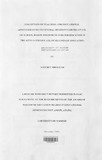| dc.description.abstract | The study focused on the perception of teachers and educational administrators on integration of school-based assessment scores with the Kenya Certificate of Secondary education examination scores in certification. The research intended to find out how teachers and educational administrators perceive integration bearing in mind that school-based assessment is viewed with suspicion by a substantial proportion of stakeholders in education in Kenya and the world over.
In addition the study investigated: How teachers and educational administrators perceive sole reliance on end of course external examination in certification; their perception of the advantages of integrating school-based assessment scores with the end of course external examination; the value teachers and educational administrators place on continuous assessment in the school setting: the challenges teachers and educational administrators face in their administration of continuous assessment; and teachers' and educational administrators' recommendations on how the reliability of school-based assessment can be enhanced.
The reviewed literature focused on the definition of assessment; continuous assessment and weighted combination; how weighted combination is used in the Kenya Certificate of Secondary Education; summative assessment and its strengths and limitations; the five key criteria for assessment i.e. humanity, validity, reliability, efficiency and frequency; advantages of school-based assessment; argument against the use of school-based assessment and the strategies that are used for integration e.g. moderation of scores, moderation by inspection, statistical moderation, weighting, combining component scores and validation.
Data pertinent to the study was collected using a questionnaire fur teachers and an interview schedule for the educational administrators. A pilot study was conducted using ten teachers and two educational administrators so as to establish whether the instrument would collect the relevant data. The results of the pilot study provided a basis for modification and perfection of the research instruments.
The revised questionnaires were administered to teachers and the revised interview questions used in the interviews with the education administrators. Teachers were selected randomly from the population. They posted a questionnaire return rate of 80 percent while the education administrators registered a return rate of 75 percent. The raw data from the questionnaires and interviews was analyzed using frequencies, percentages, and mean perception scores.
From the data, it emerged that both teacher and educational administrators held school-based assessment in high esteem despite the widespread concerns over the reliability of the school-based assessment scores. It was the feelings of a majority of the respondents that with a little more effort channeled towards enhancing the reliability of the scores, the weaknesses of school-based assessment can effectively be addressed and thus increases the validity and reliability of school based assessment.
Based on the study, the following recommendations were made: there is need for concerted effort to ensure that the examinations that are administered in the schools are standardized for the scores arrived at to be generally acceptable to all education stakeholders for purposes of certification; a moral rearmament strategy should be developed and employed to instill in the teachers and educational administrators the need for honest reporting of the learners' abilities; inspection of schools should be enhanced so as to ensure that the standards are maintained not
only in the teaching but also in the assistance of the learners; effective and efficient data management systems should be developed and sustained in the schools to enable safe storage and quick retrieval of school-based assessment data and; for school-based assessment scores to be well received for integration with the end of the course examination scores for certification, the roles of school based assessment and end of course external examination should be clearly
defined to ensure that they complement each other. | en |

